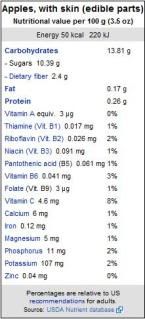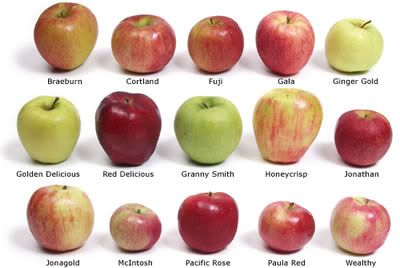
Everyone has heard that "an apple a day keeps the doctor away," but have you ever wondered what this old saying really means?
It's not because of the apple's vitamin and mineral content. Apples contain some potassium, but only small amounts of other minerals and vitamins.

What is special about an apple then?
Bulk. In other words, fiber, the structural material that's found in all plants. Apples are an excellent source of dietary fibre.

Just for entertainment purposes :)
FIBER is not a nutrient in the classic sense, the way protein or vitamins and minerals are. It's not absorbed into the blood-stream for delivery to cells and tissues. Quite the reverse: most fiber is not digested by our bodies. Most of it is just passing through - and it takes other waste materials along with it.
How fiber works?
All foods that grow in fields or on trees and bushes contribute fiber - or what was once called "roughage" - to the diet. Foods of animal origin, meat and dairy products, do not. Nor do refined grain or certain types of fruit and vegetable products, because refining means the fiber has been removed.
In the case of wheat, refining removes the bran. In fruits and vegetables, refining may remove the pulp.
Fiber is not digested by our digestive enzymes. It's true that being chewed, fiber foods do release nutrients, various vitamins, and amino acids, depending on the food.
But the bulk remains..
One vital characteristic of fiber is its ability to bind water. Pectin, a kind of fiber in our daily apple, is especially good at this.
As fiber moves through the body, it absorbs water, thus growing softer and larger.
In the medical world..
Apple Fibre is a soluble type of fibre rich in pectin. These fibres are soluble (or gel-forming) that can absorb water from the digestive tract. This process helps to increase the size of the stool and normalise its transit time through the bowel. Soluble fibre can be beneficial in cases of constipation and diarrhoea. Having adequate fibre in the diet may also prevent a person from having certain diseases like diverticulosis, colon cancer, haemorrhoids and varicose veins.
When used as part of a calorie controlled diet, studies show that soluble fibre can enhance weight loss and enhance healthy bowel function. Soluble fibre helps to normalise the levels of fats in the blood stream. Research shows that approximately 10 gms of soluble fibre taken each day can have the effect of reducing total cholesterol by up to 4% in people with elevated cholesterol levels.

Think of the familiar form of fiber called sponge. As it swells with water, a sponge becomes softer and binds other materials to its surface.
That's how edible fibre works in the body, absorbing water and binding food residue.
The result is a soft, bulky stool.
This increases the frequency of bowel movements.

0 comments:
Post a Comment